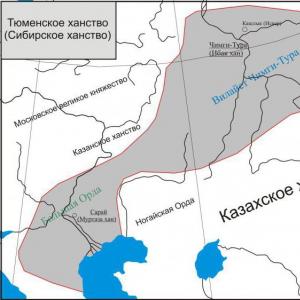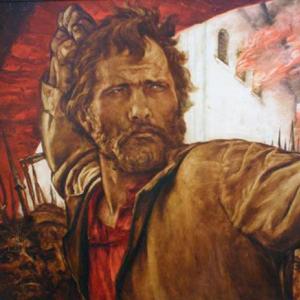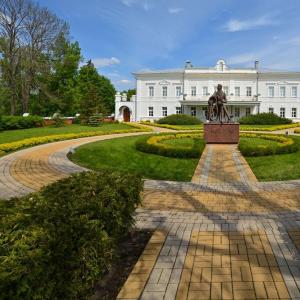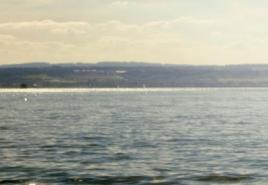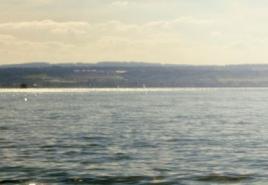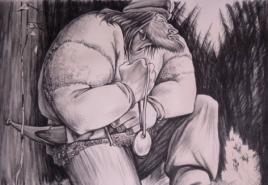Why do different nations speak different languages. Why do we speak different languages
According to biblical legends, in ancient times people became so proud that they decided to build a city and a tower up to heaven. The Lord God decided to prevent the builders by mixing their languages.
The result of the wrath of God was not long in coming. The builders could not understand each other, thus the construction of the skyscraper was stopped, and people dispersed around the globe.
There is an explanation for the difference in the language of people and from a scientific point of view. Linguists say that language, as a means of communication between people, is constantly changing. It is argued that there is no barrier to protect it from change.
There are about 5,000 living languages \u200b\u200band dialects around the world. The multilingualism of the Earth's population has developed for many reasons, for example, the disunity of the life of ancient tribes who lived in groups and did not even suspect the existence of other people.
Each tribe created its own so-called proto-language, which subsequently developed and branched out. All languages \u200b\u200bthat descended from one proto-language can be attributed to one "family" of languages. There are about 13 language families around the world, from which many of the languages \u200b\u200bthat exist today arose.
Why are there so many languages?
There is no single answer to this question, as well as to all questions concerning the distant past. There are several versions. According to one of them, there is a single language from which all the others were born. According to another version, the Neanderthals had a person with two mutations in the FOXP2 gene on chromosome 7, as a result of which this person's body became capable of language.
The question about the language began to be asked by people a very long time ago, from the time of ancient Egypt. Ancient people, when faced with foreigners, did not understand their speech and considered them second-class people. The Greeks contemptuously called them "barbarians" because their speech seemed like a meaningless set of sounds: "var-var-var". Now, with the help of a computer, people can recreate many ancient languages \u200b\u200bfrom the roots of modern words. Studying languages \u200b\u200bfrom different angles, linguists have found that many languages, even at first glance completely different, have something in common. But why are they different? The answer can be based on observations of the languages \u200b\u200bof modern people. In the Russian language there are words that are called differently in different regions. Some call "beet" "beetroot", "Thursday" - "four", "curb" - "curb". It all depends on the dialects. Neighbors have almost no differences in language; those who live at a distance differ in individual words or sounds. But their speech can still be understood. But it is not so easy to understand the neighbors' neighbors. And what the distant ones say, you can't make out at all. This is how a new language appears. It is easy to determine that Russian and French are different languages: the speakers of one do not understand the speakers of the other at all. What is pomme in French? Hardly not having studied French, a person will guess that this is an "apple". And if you compare Russian and Ukrainian: "yabluko", then there is no need for translation, the word is clear, by itself. Despite the fact that the languages \u200b\u200bare different, people who speak them will easily understand each other - there are so many similarities between them. But in addition to the remoteness of peoples from each other in distance and in time, the appearance of different languages \u200b\u200bis greatly influenced by geography. On the island of New Guinea, the population speaks almost a thousand different languages! And all because the territory of the island is dotted with mountains and jungle. It is difficult for people to navigate through it, they rarely communicate, they hardly exchange new words, so each village has its own language. And linguists call the Caucasus "a mountain of languages". There was even an old Arab legend: "Allah had a bag in which different languages \u200b\u200bwere stored. Traveling around the world, he gave each people one language. But when he traveled the whole world, except the Caucasus, there were still a lot of languages \u200b\u200bin the bag. Allah just turned the bag over the mountains and poured out all the languages. Therefore, now there each tribe has its own dialect. " There are a lot of such countries and areas with different dialects.
According to biblical legends, in ancient times people became so proud that they decided to build a city and a tower up to heaven. But God decided to interfere with their plan by mixing the languages \u200b\u200bof the ancient builders so that they ceased to understand each other ...
Why do people speak different languages? Linguists ready to reveal the Babylonian mystery
http://www.zavtra.com.ua/news/socium/49232
Before the start of the great migration from Africa, something happened to humanity, and a new form of communication appeared. Most modern languages \u200b\u200bwere born during the Ice Age. Having made this conclusion, linguists are getting closer and closer to the origins of speech, comparing their hypotheses with the biblical legend.
According to biblical legends, in ancient times people became so proud that they decided to build a city and a tower up to heaven. But God decided to interfere with their plan by mixing the languages \u200b\u200bof the ancient builders so that they ceased to understand each other. The grandiose construction stopped, and builders of different languages \u200b\u200bscattered all over the earth.
Linguists have their own view of the problem - the language is constantly changing, and there is no barrier that could protect it from these transformations. Words invented and borrowed from other languages \u200b\u200bare constantly wedging into our communication.
At the same time, for reasons not entirely clear, some languages \u200b\u200bevolve much faster than others. Italian, for example, has remained much closer to classical Latin than French. Lithuanian has many words that exactly correspond to Sanskrit, which was spoken 3.5 thousand years ago.
American linguists have conducted research in an attempt to reduce all the world's languages \u200b\u200bto a single root. About 50 thousand years ago, something unusual happened to our ancestors in Africa. Moreover, ancient people, who have existed for at least 150 thousand years, suddenly began to behave differently.
Until then, their behavior was barely different from that of the Neanderthals. They used stone tools and possessed a form of communication that scientists assume was based on gestures, facial expressions and sounds.
The advent of speech accelerated progress. Scientists believe that a new means of communication has allowed humanity to make a huge leap forward. This event was more important than the computer or biotechnological revolutions combined, experts say.
It is assumed that the ancient people developed speech before the great migration from Africa. “Perhaps they were trying to discuss the ways of the upcoming migration to Europe and Asia, but it was not so easy to do only with gestures in this regard,” the scientists joke.
A team of researchers from the Santa Fe Institute is working to find the "mother of all languages." The Evolution of Human Languages \u200b\u200b(EHL) project, led by Nobel laureate physicist Murray Gell-Mann, is creating a unique etymological base for all the world's languages. EHL linguists try to reconstruct and then compare ancestral languages, moving closer and closer to the origins of human speech. The project has already caused a mixed reaction from the scientific community. Many linguists are convinced that beyond the threshold of eight thousand years, all attempts to find a language root are unreasonable.
The EHL linguists were only provoked by the criticism. They grouped all the world's languages \u200b\u200binto 12 linguistic superfamilies, four of which (including the languages \u200b\u200bof Eurasia, North Africa, Oceania and possibly the Americas) experimentally combined into one company, calling it Borean (which means "northern"). The ancestor of most modern languages, according to researchers, appeared 16 thousand years ago, when glaciers covered most of North America and Europe.
Linguists continue to develop their hypothesis. They seem to have proved how the lion's share of the Eurasian, American and North African languages \u200b\u200bcould be formed from one language group.
In their opinion, the Ice Age is to blame for everything. 20 thousand years ago, at its peak, humanity lost most of its linguistic diversity. During the advancement of the glacier to the south, people migrated with it and mixed with each other, both genetically and linguistically. As a result, the most complex "linguistic puree" was formed, which scientists tried to make out.
There are about 5,000 living languages \u200b\u200band dialects around the world. The multilingualism of the Earth's population has developed for many reasons, for example, the disunity of the life of ancient tribes who lived in groups and did not even suspect the existence of other people. Each tribe created its own so-called proto-language, which subsequently developed and branched out. There are about 13 such proto-languages \u200b\u200bin total.
People from different countries around the world speak different languages... Sometimes in one state there are several dozen languages \u200b\u200band dialects, for example, in the United States in New York alone, people speak 129 languages \u200b\u200band dialects. Distinguish between living (spoken), dead (for example, Latin) languages, the language of the deaf and dumb, artificial languages \u200b\u200band even fictional, for example, elvish from J. Tolkien's trilogy "The Lord of the Rings".
The common function of all varieties of languages \u200b\u200bis communicative. It is a means of sound, sign (written) and sign communication, information transfer.
Until now, there are two scientific hypotheses for the origin of languages, as well as many myths and legends. Some scholars suggest that all modern languages \u200b\u200boriginate from one language, the so-called pro-world. However, it is not necessarily the primary language. There may have been other languages \u200b\u200bin the past that have become extinct. This linguistic hypothesis is called the theory of monogenesis.
The second hypothesis, the theory of polygenesis, is that the languages \u200b\u200bthat exist today are descended from several proto-languages \u200b\u200bthat were created and developed independently of each other. In any case, none of the concepts can be confirmed historically due to the long age and lack of evidence.
One way or another, the tribes that inhabited the Earth several millennia ago already spoke different languages. The planet's population grew, states were created, there were massive migrations and mixing of peoples, lands were seized, the social order changed. All these changes could not but affect the development of languages.
The tribes grew, branched out, mastered new territories, the same languages \u200b\u200bin different places developed in different ways, dialects appeared. Thus, nowadays it is already difficult to imagine that, for example, English and Russian languages \u200b\u200bbelong to different branches (Germanic and Balto-Slavic) of the same language family - Indo-European. Its proto-language, Proto-Indo-European, arose about 5-6 thousand years ago.
There are 5000, and according to some estimates, about 7000, languages \u200b\u200bin the world. They are studied by the vast humanities of linguistics. Linguists study linguistic laws and derive general patterns, develop and supplement the existing classification. World languages \u200b\u200bhave many common features, therefore linguistics studies similar tendencies of languages, analyzes them and deduces universal hypotheses characteristic of most known languages.
Why do people speak different languages? There is no single answer to this question. Scholars and the Bible interpret it differently. The first argue that initially all people spoke the same language and understood each other perfectly. They resolved all emerging issues peacefully, without resorting to violence. To some extent, this was due to their compact residence. To put it simply, all the tribes lived in the neighborhood, they could easily communicate with each other, in one language, understandable for everyone.
The Bible takes a different view. In order to have access to heaven, people decided to build a tower, which was called the Babylonian tower. However, they did not ask permission from God, which made him angry. As a punishment, he settled people all over the planet, and forced them to speak in different languages, which led to serious difficulties in their communication.
This is how the Bible interprets multilingualism. Scientists, however, agree that the process of the emergence of different languages \u200b\u200bwas quite long. At first, people lived on earth in small groups and communicated with each other with gestures. Their main occupation was hunting. But in the process of evolution, a person has additional needs, which led to the unification of various tribes. Now a person had not only to hunt, but also to build housing, engage in agriculture, make tools, sew clothes, etc. This could only be done together. This is how the peoples arose, with their own language of communication.
Initially, it differed little from its primitive counterpart, and only over time it began to acquire its own dialect. At the same time, this process took place individually for different peoples. The end result is well known to us. Today every nation has its own language, and in order to understand each other we have to resort to the help of a translator. At the same time, the language transformation continues. To some extent, this is facilitated by wars leading to the seizure of foreign territories. The result is a fusion of languages, leading to the emergence of certain linguistic symbiosis, and completely unique dialects. This, for example, is the Transcarpathian dialect. Their language contains many Slovak, Magyar, Rusyn and Ukrainian words.
This is how new languages \u200b\u200bcome into being. They can retain their grammar, but include completely new expressions. At the same time, the language of the conqueror's people always wins. So, for example, happened with the tribes of the Franks, who lost their language and came under the influence of Gaul. All that remains of it is the name of the country, which we all know well. In this case we are talking about France.

